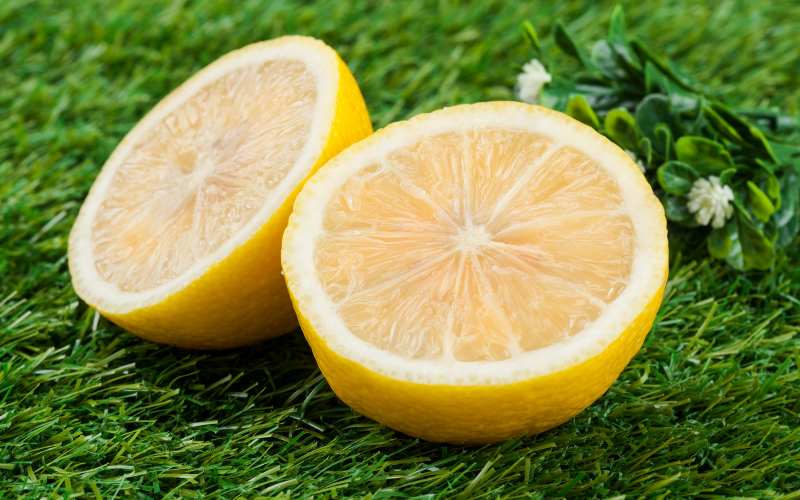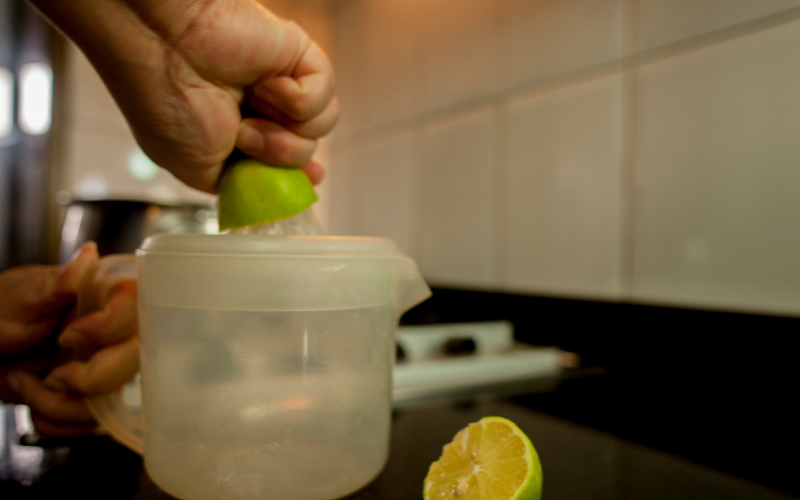Lemon juice is often touted as a cure-all for all types of household problems. It cleans, freshens, and kills bacteria. Could it also be the ideal DIY weed and grass killer? If it is, what are the downsides to this potentially inexpensive and easily available weed killer? Will lemon juice kill grass or unwanted weeds with little effort? The answer to all of these questions can be found below.

Will Lemon Juice Kill Grass?
Yes, lemon juice will kill grass. No matter what type of grass you’re looking to eliminate, a thorough lemon juice application will break through the moisture barrier and harm that plant to the point where it will be difficult for it to survive.
What Will Lemon Juice Do to Grass?
Lemon juice is an acidic substance that when applied at full strength to any plant, including all grasses, breaks through the outer waxy layer and makes it difficult or impossible for that plant to maintain its necessary moisture level. Once the waxy layer is compromised, these plants can dry out quickly and are susceptible to being “burnt” by the sun.
What Will Lemon Juice Do to the Soil?
When used responsibly and in the quantities most people will apply them to their weeds, lemon juice should have no noticeable effects on the soil after a single rain or several quick passes of a garden hose or sprinkler system over the lawn.
In very high doses or if, say, a standard 500ml bottle is spilled on a single square foot, the level of acidity in the soil will be raised. The best solution in this situation to neutralize this sudden change in pH is simply to add water to the area to flush the lemon juice further out or down into the soil.
Does Lemon Juice Kill Grass and Weeds?
Yes, lemon juice is capable of killing grass and small weeds. For these small plants, natural strength lemon juice should be applied directly to the leaves and stem of the plant. Plants in sunny areas will be easier and take less time to get rid of than plants in shady areas as sunlight can help the lemon juice dry onto these plants more quickly, thus speeding up its effects.
When you start needing to eradicate larger, fast-growing weeds like false rhubarb or pigweed, you may need something a bit stronger. The quantities of lemon juice needed to burn down large weeds like these will be both cost-prohibitive and damaging to nearby plants due to the acidic nature of the runoff and the time needed to be effective.
How to Clean Up a Lemon Juice Spill or Overspray
While applying lemon juice to your weeds, you could accidentally spill some on a patch of grass that you want to keep. Overspray is also a common problem with all types of herbicides. Lemon juice can be an easy herbicide to spring back from but only if you react quickly to a spill or overspray event. All you need to do is dilute the lemon juice by as little as 1 part lemon to 4 parts water. For a simple spray, this can mean just wiping the area or plant with a sopping wet cloth.
Will lemon juice damage grass if allowed to sit on it for a few minutes before being diluted? Yes, it can. Lemon juice can be an effective grass killer in as little as 20 minutes if in direct sunshine.
Related Article: What Kills Grass?

How Do You effectively Apply Lemon Juice to Grass and Weeds?
Freshly squeezed lemon juice or lemon juice from concentrate can be used. It is best to use lemon juice at its “natural” strength. If using a concentrate, it should say to what point it is diluted on the bottle. Most concentrates are sold at natural strength though some are sold at “double” strength. This latter can be diluted by half or used as-is for a very effective weed-killing concentrate.
The lemon juice can then be added to a spray bottle or dabbed onto a dry sponge for direct application with no possibility for overspray. Apply the solution as carefully as possible to only the weeds you wish to kill. Lemon juice must be applied to the leaves and stem of a plant for it to be effective. If any lemon juice gets on another plant or patch of grass, it must be washed off immediately to prevent damage.
Allow the lemon juice to dry on the unwanted weeds or grass. The solution will need to sit on the plants for several hours. Direct sunlight exposure can speed up this process. Browning or withering should be noticeable within just a few hours on a hot, sunny day.
Lemon Juice Can Be a Fast-Acting, DIY Herbicide
Lemon juice is an effective herbicide for something most people keep in their cupboard or fridge. Not only that, but it’s relatively harmless to the soil and has few lasting effects. It may be tedious to apply, but few things are both as effective and as safe as lemon juice when it comes to eliminating unwanted grass and weeds.


Leave a Reply